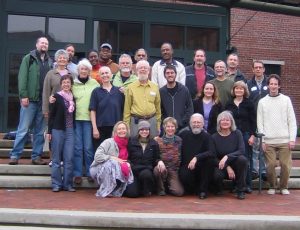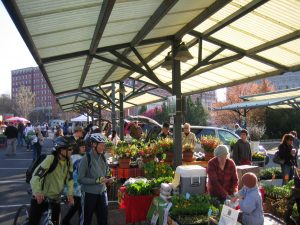 I'm just back from a weekend-long gathering in Bloomington, Indiana, where I was joined by ~25 other fine folks for a "Transition Training" event. The Transition US movement is part of a vibrant, international grassroots movement that builds community resilience in response to the challenges of peak oil, climate change and the economic crisis. Today's edition of the New York Times Magazine had a cover story featuring the Transition movement, including one of the facilitators who I had the benefit of working with this weekend, Michael Brownlee.
I'm just back from a weekend-long gathering in Bloomington, Indiana, where I was joined by ~25 other fine folks for a "Transition Training" event. The Transition US movement is part of a vibrant, international grassroots movement that builds community resilience in response to the challenges of peak oil, climate change and the economic crisis. Today's edition of the New York Times Magazine had a cover story featuring the Transition movement, including one of the facilitators who I had the benefit of working with this weekend, Michael Brownlee.
A few thoughts on how it went, and what's next:
This was a very unifying, clarifying event for me. It knitted together elements from all facets of the "save the world" efforts I've put my time and energy into thinking about and acting on over the last ten years. From organizing national conferences around Daniel Quinn's books, to attending regional conferences about Peak Oil and community-based solutions, to helping with other statewide efforts to promote sustainability efforts, and then to more locally focused efforts such as local food issues and the 100-Mile Radius Potlucks, to lending my skills to local entities like the Cope Environmental Center, trying to make my own life more sustainable, to identifying and confronting the very personal fears around sustainable living - the notion of facilitating a community transition to lower energy usage (and all of the amazing social, cultural, educational, political, and personal opportunities that come with it) serves as a nice umbrella for all of these. Better yet, it's presented in terms of possibilities and better living, true homeland security, and returning to community values of days past - these are ideas that transcend political boundaries or ideological conflicts...they're just about doing what's needed to survive.
 The purpose of the event was to equip each of us with the tools and support to initiate transition efforts in our own communities. It was successful in that - from getting more up-to-date information about the data points of Peak Oil, to a cornucopia of documents, slides, and links, to some hands-on practicing of training/conference facilitation tools, it was a broad coverage of community organizing skills. There were also plenty of useful stories of success and failure from other participants doing all sorts of interesting things (Chicago, West Virginia, Pittsburgh, etc.) and the added bonus of deep wisdom from fellow-participant Peter Bane, who publishes Permaculture Activist magazine.
The purpose of the event was to equip each of us with the tools and support to initiate transition efforts in our own communities. It was successful in that - from getting more up-to-date information about the data points of Peak Oil, to a cornucopia of documents, slides, and links, to some hands-on practicing of training/conference facilitation tools, it was a broad coverage of community organizing skills. There were also plenty of useful stories of success and failure from other participants doing all sorts of interesting things (Chicago, West Virginia, Pittsburgh, etc.) and the added bonus of deep wisdom from fellow-participant Peter Bane, who publishes Permaculture Activist magazine.
For me, I was certainly there with an eye on how I could help Richmond, especially as this community seems to flounder about in asking "what can we do in the face of economic collapse and other global crisis?" See exhibit A, today's editorial in the Palladium-Item ("Region needs targeted, local development strategies"), which tries to tell us what we need, but offers no practical advice on how to do it or why it would help, at least not beyond the same old same old: tax abatement incentive packages. As I've said before, without a driving vision that informs the hunt for more jobs, we're just treading water. And as I told the EDC when they invited me to speak to their board, we're overlooking and underestimating the importance of "going local" - building a self-reliant community instead of looking for more imported resources (jobs or otherwise).
I think I'm more ready now to be a part of spreading that message a little more effectively. This training helped me see an approach and find a tool-set that makes some practical next steps clear, and provided the clarity, inspiration and motivation to make it real for me again.
If you're in the Richmond area and are interested in talking more about how this city can transition to a more self-reliant, resilient way of life, I hope you'll make contact with me if you haven't already. And if you're elsewhere and want to learn more about the Transition movement, there are trainings happening all the time, or you can bring one to your own community.
 I’m a journalist, publisher, software developer and entrepreneur with experience as a founder and organizational leader. Work with me or learn more about me.
I’m a journalist, publisher, software developer and entrepreneur with experience as a founder and organizational leader. Work with me or learn more about me.
You like that spot, in the pic...
(Yet, always in the middle of things...!)
This training must have been SO exciting! It's especially refreshing to know there are folks out there with solid ideas that don't involve more consumerism. We know lots of individuals trying to live sustainably in their own corners, but I'm glad there's a movement. I look forward to hearing more.